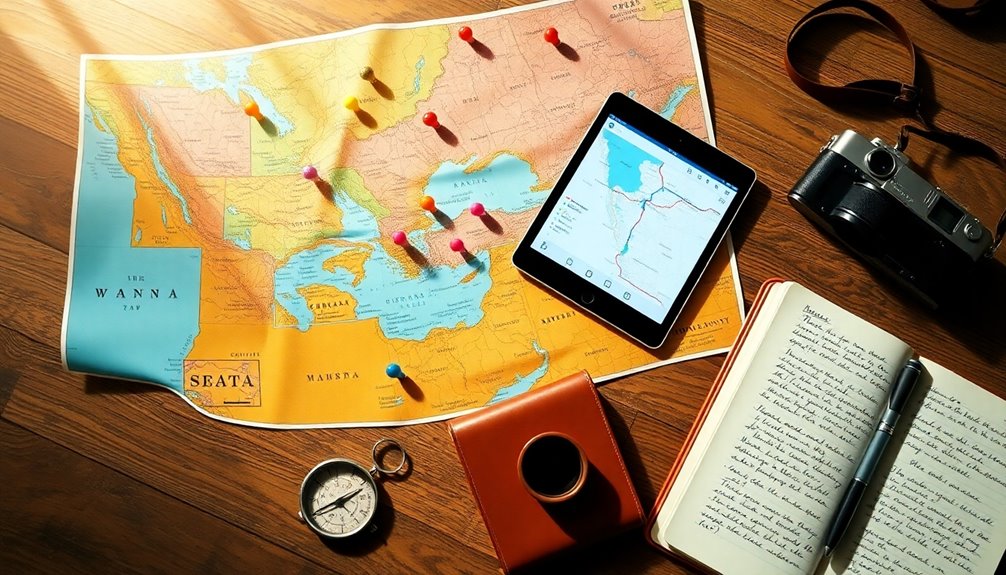To plan a memorable road trip, start by choosing your travel companions wisely and discussing budget expectations. Next, select a destination that aligns with everyone’s interests while researching must-see attractions. Create a detailed route using apps like Roadtrippers or Google Maps, and find suitable accommodations through platforms like Airbnb. Confirm your vehicle’s prepared and pack entertainment options for the journey. For more tips on enhancing your trip experience, there’s plenty more to explore. Additionally, consider incorporating local cuisine into your travel itinerary by researching popular restaurants or food markets along your route. This not only enriches your experience but also supports local businesses. For those looking for specific advice, there are numerous resources available with European road trip tips that can further enhance your adventure and ensure you don’t miss out on hidden gems along the way.
Key Takeaways
- Use travel planning apps like Roadtrippers to discover attractions and customize your itinerary efficiently.
- Research and align your destination with your group's interests, considering seasonal events and local festivals.
- Create a detailed budget that includes all trip costs, and set aside a contingency fund for unexpected expenses.
- Ensure vehicle preparedness by conducting inspections, packing an emergency kit, and keeping necessary documentation accessible.
- Curate a diverse entertainment plan with playlists, audiobooks, and interactive games to keep everyone engaged during the trip.
Selecting Your Travel Companions
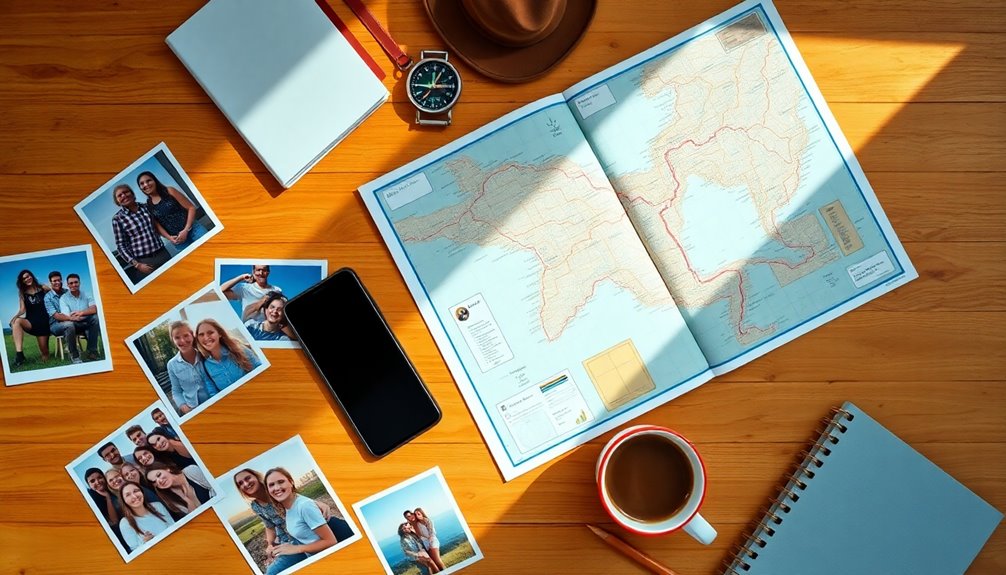
When selecting your travel companions, have you considered how their interests and travel styles align with yours? Choosing travel companions who share similar passions enhances your overall enjoyment.
Aim for a group of friends that includes 3 to 5 individuals, making decision-making easier and dynamics more manageable. Prioritize flexibility; road trips often involve spontaneous changes, and adaptable companions can make a world of difference.
Discuss budget expectations upfront to guarantee everyone agrees on accommodation, food, and activity costs.
Finally, compatibility in personality traits is essential. Travelers who communicate openly and resolve conflicts amicably contribute to a harmonious experience, making your road trip memorable for all the right reasons.
Additionally, fostering open communication can help address any concerns or preferences among your travel group before the trip begins.
Choose wisely, and your journey will be seamless.
Choosing the Perfect Destination
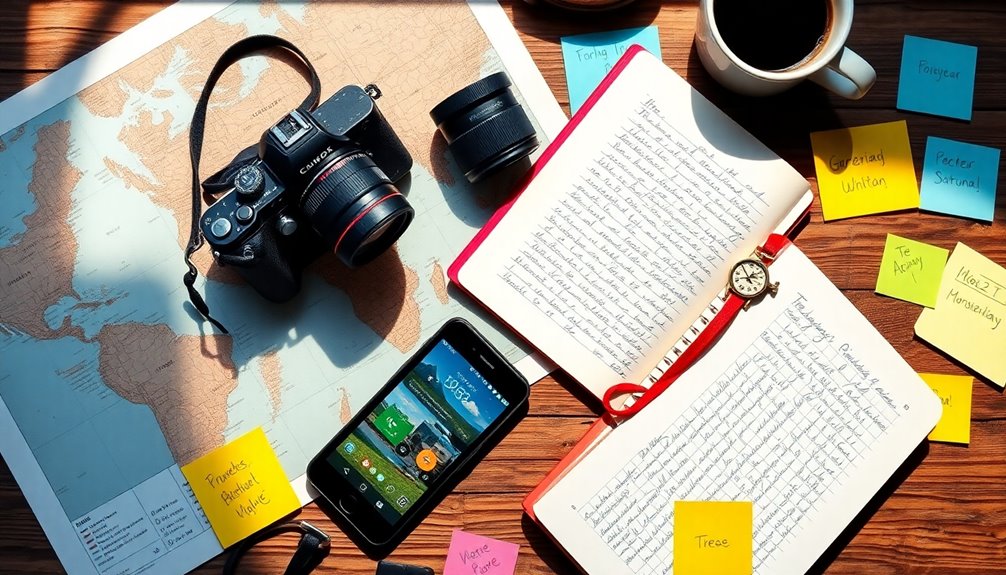
When you're picking a road trip destination, think about the season and how it can enhance your experience.
Make sure the spot aligns with your group's interests, whether they love hiking, food, or culture.
A well-chosen destination can make all the difference in creating unforgettable memories together.
Seasonal Experience Considerations
Choosing the right road trip destination often hinges on the season, as different times of the year offer unique experiences. Pay attention to seasonal weather patterns; summer might lead you to beaches or national parks, while winter invites skiing or holiday festivities.
Research regional events and festivals during your chosen season, as these can enhance your travel experience and provide cultural insights. Some destinations shine in specific seasons—New England dazzles with fall foliage, while the Pacific Northwest blooms in spring.
Be mindful of peak tourist seasons; traveling during off-peak times not only means fewer crowds but often lower costs for accommodations and attractions.
Ultimately, aligning your trip with seasonal activities and events can elevate your adventure.
Group Interest Alignment
Finding the right road trip destination for your group can make or break the experience. Start by identifying your group's shared interests, whether it's outdoor activities, cultural experiences, or culinary adventures. This alignment guarantees everyone's engaged and excited.
Research seasonal attractions and events, as visiting during peak times can lead to unique activities that enhance your journey. Utilize travel communities and forums for feedback on appealing destinations that suit your group's preferences.
Discuss the experiences desired, like relaxation or adventure, to reach a consensus and avoid conflicts. Finally, consider travel logistics by checking proximity to major routes and nearby airports, allowing for easy navigation and potential detours to explore additional points of interest along the way.
Budgeting for Your Road Trip
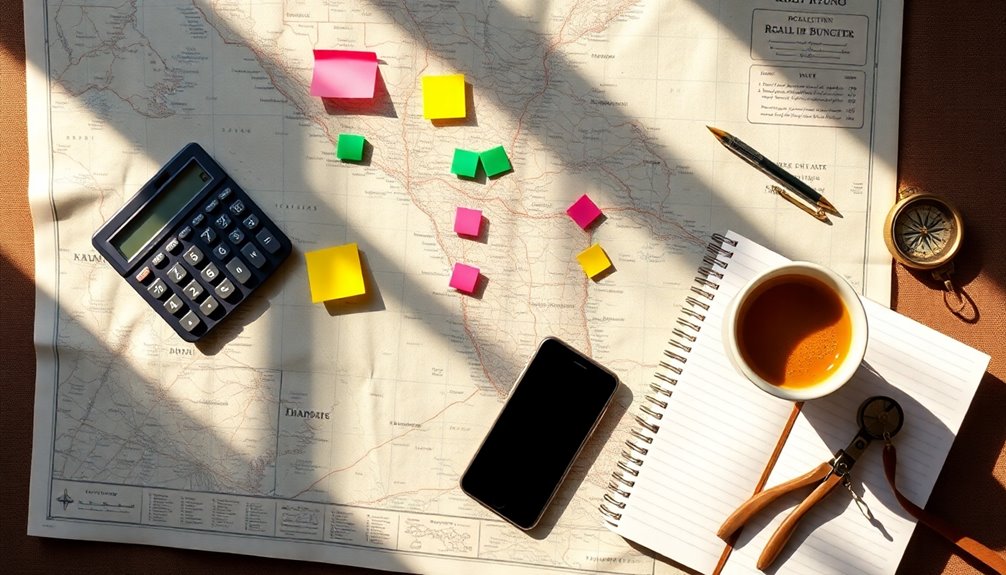
When budgeting for your road trip, start by determining the overall trip costs, including accommodation, food, and gas.
Make sure to divide expenses fairly among all travelers to avoid any financial stress.
It's also smart to plan for unexpected expenses, so set aside a little extra just in case. Additionally, consider increased turbulence that may affect travel plans during certain seasons, which can lead to additional costs.
Determine Overall Trip Costs
Estimating your overall trip costs is essential for a successful road trip. To help you determine your budget, consider these key factors:
- Fuel expenses: Use a trip-cost calculator for accurate estimates based on gas prices and your vehicle's MPG.
- Accommodation and dining: Research local dining options to save on meals, aiming for a daily budget of $100-$150 per person.
- Activities: Don't forget about entry costs for national parks, which can range from $10 to $50 per stop.
Additionally, set aside a contingency fund of 10-20% of your overall budget for unexpected expenses.
Divide Expenses Among Travelers
After figuring out the overall trip costs, it's time to focus on how to fairly divide those expenses among travelers. Start by establishing a clear budget that outlines major costs like accommodation, food, gas, and activities.
Make sure all group members agree on their individual contributions. A trip-cost calculator can help estimate total expenses, making it easier for everyone to understand their share based on the planned itinerary.
Utilize budgeting apps or spreadsheets to track expenses, keeping everyone informed. Discuss potential budget cuts, such as shared accommodations or group meals, to help everyone stay within their limits.
Finally, create a contingency fund by setting aside a small percentage of the budget, making certain all travelers contribute to cover emergencies or unplanned costs.
Plan for Unexpected Expenses
Planning for unexpected expenses is essential to guarantee your road trip stays enjoyable and stress-free. To effectively manage your budget, consider these three tips:
- Set aside a contingency fund of 10-15% of your total budget for vehicle repairs and emergency lodging.
- Use budgeting apps to track daily expenses and adjust your spending as needed.
- Research average costs for gas, food, and accommodations to create a realistic budget that accounts for fluctuations.
Don't forget to factor in additional costs like tolls, parking fees, and attraction entry fees, which can add up.
Always prepare for emergencies by carrying a small amount of cash and ensuring you have roadside assistance coverage for any unexpected troubles on your journey. Additionally, consider setting up an emergency fund to provide financial stability during your travels.
Researching Must-See Attractions

What attractions should you prioritize on your road trip? Start researching must-see attractions by using travel apps like Roadtrippers, which help you customize your itinerary based on your interests.
Local tourism websites and travel blogs are goldmines for insider tips on interesting places and hidden gems you might miss otherwise.
Don't forget to check social media platforms like Instagram and Pinterest for trending spots that look great and are shareable.
Online travel forums, like TripAdvisor, offer valuable travel tips and firsthand reviews from fellow travelers.
Finally, consider seasonal events during your trip, as they can provide unique experiences and insights into local culture, along with opportunities to discover local restaurants that you can't find anywhere else. To enhance your journey, explore the promise of adventure that every road holds, encouraging you to embrace spontaneous detours along the way.
Mapping Your Route Effectively
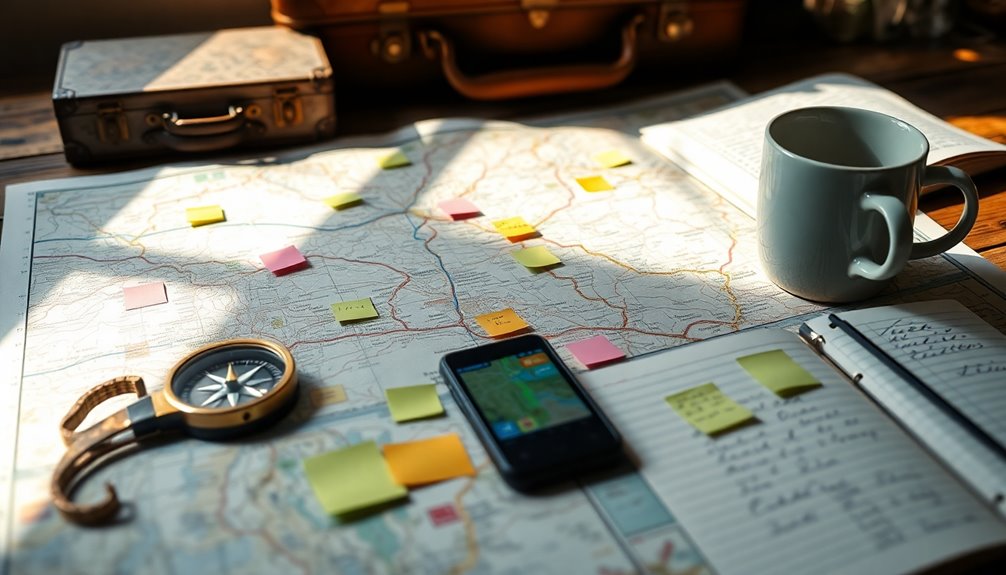
Once you've identified the must-see attractions for your road trip, the next step is mapping your route effectively. Here are some tips to enhance your travel planning:
- Use Google Maps' My Maps feature to customize your route, adding up to 10,000 points of interest.
- Download offline maps or carry a traditional road atlas as a backup for areas with poor cell service.
- Utilize Waze for real-time traffic updates to avoid congested areas and road hazards.
Additionally, explore scenic routes designated by the US Department of Transportation for a more enjoyable drive.
Consider using travel planning apps like Roadtrippers to discover attractions and dining options along the way.
With detailed planning, your road trip will be smooth and memorable!
Booking Transportation Options
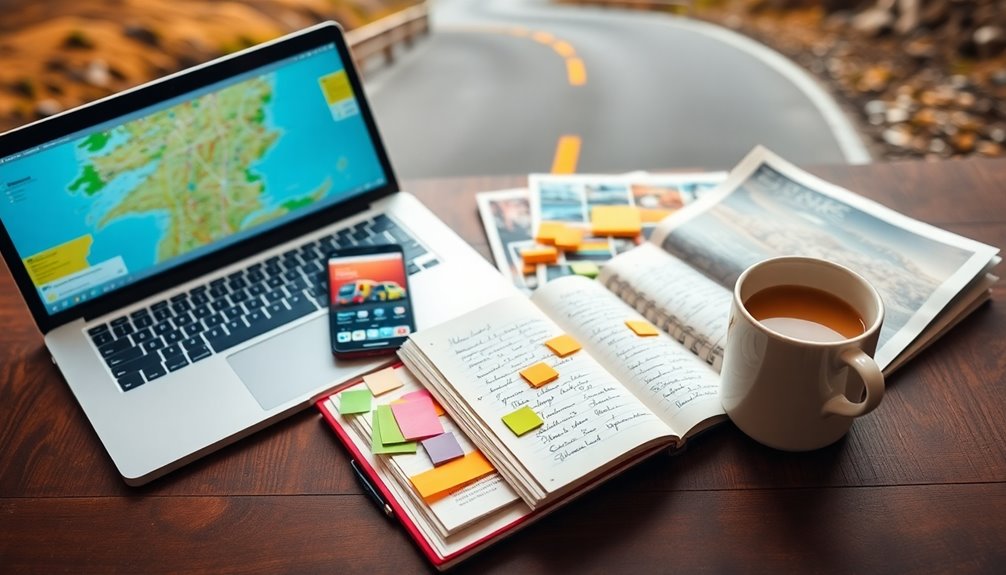
Securing reliable transportation is essential for a successful road trip. When booking transportation options, start by comparing rental car prices across multiple platforms like Kayak, Expedia, and the rental company's website to guarantee you get the best deal.
Don't forget to check for hidden fees like insurance, fuel charges, and mileage limits that can unexpectedly inflate your costs. If you're planning to start and end your trip in different locations, consider a one-way rental for added flexibility, though be aware of potential extra fees.
If you're traveling abroad, obtaining an international driving permit is often required and can help with local authorities.
Finally, reserve your transportation well in advance, especially during peak seasons, to secure better rates and availability.
Finding Suitable Accommodations
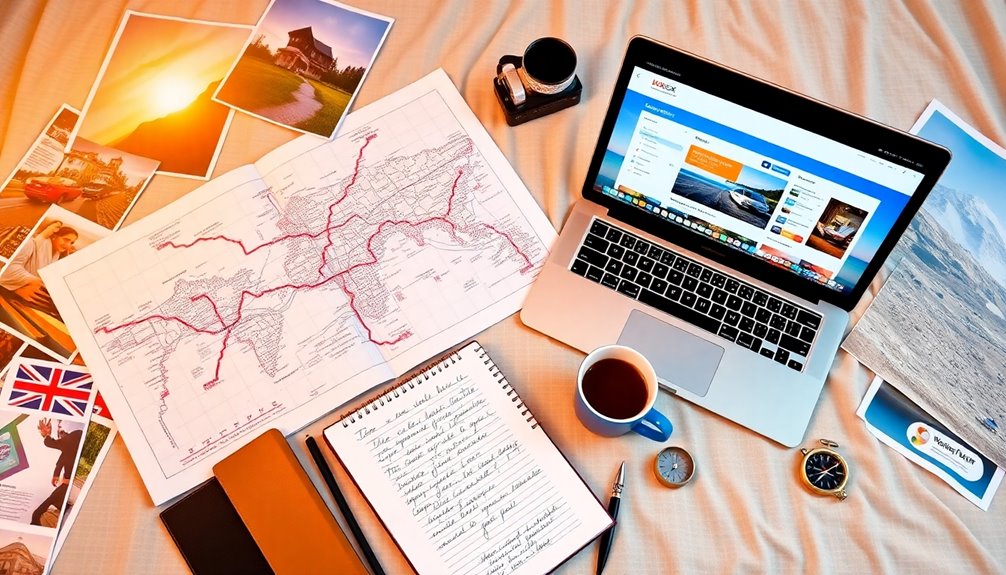
When planning your road trip, finding suitable accommodations can greatly enhance your experience. Here are three key factors to take into account:
- Budget: Use region-specific sites like Airbnb and Booking.com to find options that fit your financial plan.
- Safety: Research the safety of areas where potential lodging is located, especially in less tourist-friendly regions.
- Cancellation Policies: Always check cancellation policies before booking to avoid complications if plans change unexpectedly.
Think about Couchsurfing for a unique, authentic experience while saving on costs.
In developed countries, established hotel chains offer reliability and safety, making them a strong choice for accommodations.
Prioritize these elements to guarantee a comfortable and stress-free stay during your journey.
Ensuring Vehicle Preparedness
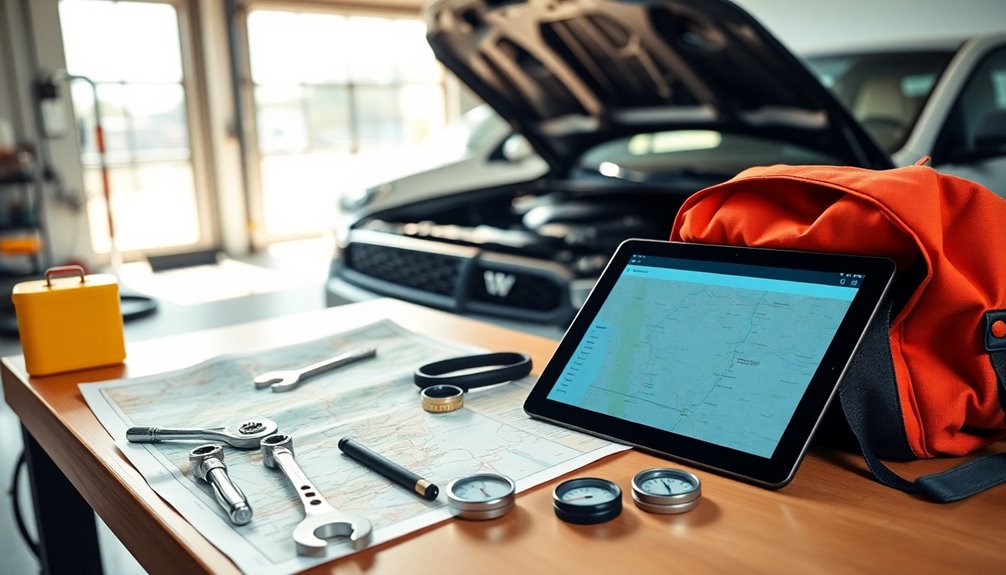
After settling your accommodations, the next priority is ensuring your vehicle is ready for the adventure ahead.
Start with a thorough vehicle inspection; check fluid levels like oil, brake fluid, and coolant. Make sure your tire pressure and tread depth are safe for the journey.
It's wise to schedule a mechanic visit at least a week before your trip to tackle any potential issues, such as battery health.
Don't forget to pack an emergency kit containing a spare tire, jumper cables, and a first aid kit, just in case.
Finally, keep all necessary documentation, including your car insurance, registration, and driver's license, easily accessible for any roadside checks or emergencies that might arise during your road trip planning. Additionally, consider having a home security system in place to protect your property while you're away.
Creating an Entertainment Plan
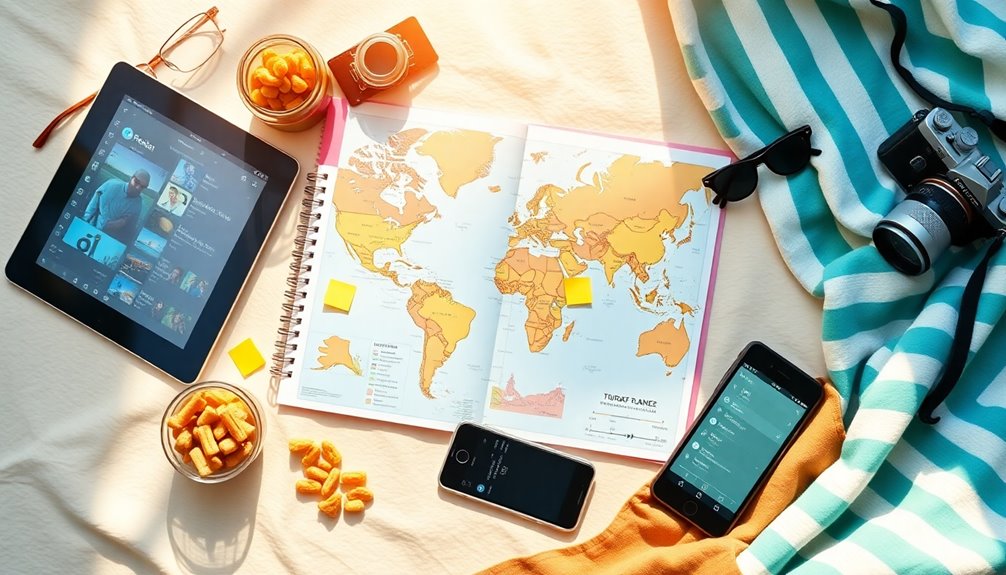
To keep the excitement alive during your road trip, it's essential to create an entertainment plan that caters to everyone in the car. Here's how you can do it:
- Diverse Playlist: Curate a playlist with at least 30 songs across various genres to keep the mood lively.
- Audiobooks & Podcasts: Download 5-10 hours of engaging audiobooks or podcasts for those quieter moments.
- Interactive Games: Incorporate interactive games like license plate bingo or trivia challenges to engage all passengers.
Don't forget to plan scheduled breaks at quirky roadside attractions or scenic viewpoints for a bit of fun and relaxation. Additionally, consider using a portable home cinema projector to enjoy movies during long stops or at your accommodation.
You can use apps like Spotify or Apple Music for your playlists, ensuring offline access to keep the entertainment flowing seamlessly.
Prioritizing Safety Measures
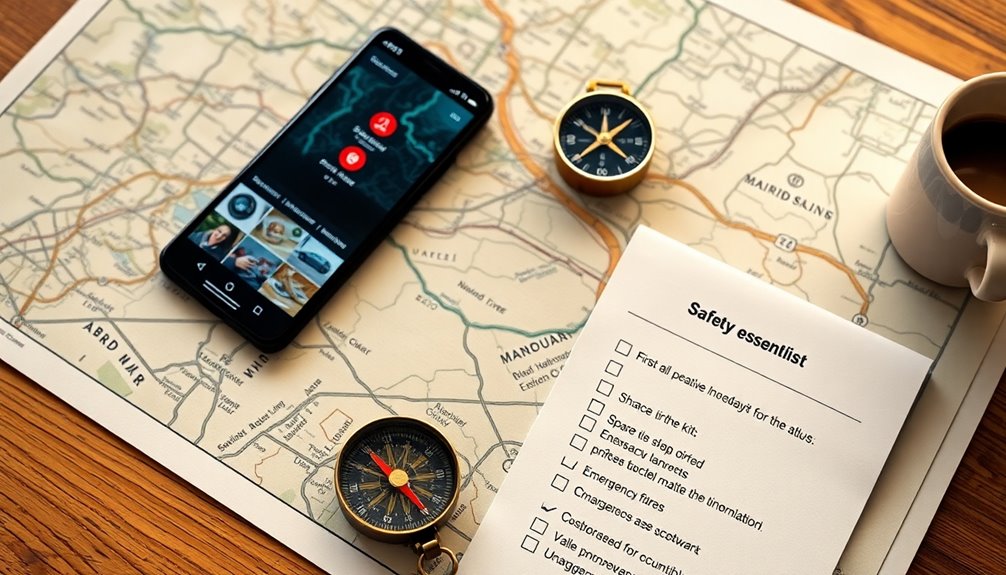
While keeping the fun alive with your entertainment plan, don't overlook the importance of safety measures during your road trip.
Start by packing a well-stocked first aid kit with antiseptic wipes, band-aids, and pain relievers to handle minor injuries. Familiarize yourself with the driving laws in each state you'll pass through, as penalties can vary.
Make certain everyone wears seatbelts at all times; they reduce the risk of fatal injury by 45%. Plan regular rest breaks every two hours or 100 miles to combat fatigue, a major cause of accidents.
Finally, keep emergency contact numbers handy, including roadside assistance and local authorities, so you can quickly address any unexpected situations that arise.
Prioritizing safety makes for a smoother journey.
Frequently Asked Questions
What Should Be Included in a Trip Planner?
When you create a trip planner, include a detailed itinerary that outlines daily activities and driving times.
Don't forget a budget section to track accommodation, food, and gas expenses. A packing list tailored to your destination's climate is essential, too.
Make certain to add a safety section with emergency contacts and vehicle maintenance checks.
Finally, highlight points of interest to guarantee you don't miss out on any must-see attractions along the way.
How to Plan the Perfect Road Trip?
You're itching to hit the open road, but how do you make it perfect?
Start by gathering friends who vibe with your travel style and budget. Next, plot your route using Google Maps, but leave room for unexpected adventures.
Set a clear budget—don't let costs sneak up on you! Before you go, verify your vehicle's ready and packed with essentials.
Finally, embrace spontaneity; those unplanned moments often become the best memories.
How Will You Plan the Details of the Trip?
To plan the details of your trip, start by mapping out your route using Google Maps, marking must-see and optional stops.
Set a daily mileage goal of 200 to 300 miles, and schedule breaks every two hours to stay refreshed.
Share your itinerary with everyone involved, allowing for feedback and flexibility.
This way, you can adapt your plans while keeping the journey enjoyable and stress-free, making the most of your road trip experience.
How to Create Your Own Road Trip Map?
Creating your own road trip map can be like crafting a beautiful journey, full of memories waiting to unfold.
Start by using Google Maps' My Maps feature, where you can pinpoint your favorite stops and hidden gems. Don't forget to sprinkle in scenic routes and local attractions.
For real-time updates, Waze is your friend. Access your custom map on your phone, and let your adventure begin—smooth, organized, and unforgettable!
Conclusion
As you commence your road trip, think of your journey as a tapestry woven from countless threads—each choice, each companion, and each detour adding color to your adventure. Your careful planning is the map guiding you through uncharted territories of joy and discovery. Embrace the open road, let spontaneity be your compass, and cherish the moments that turn into unforgettable memories. After all, it's not just the destination that matters, but the path you take to get there.
